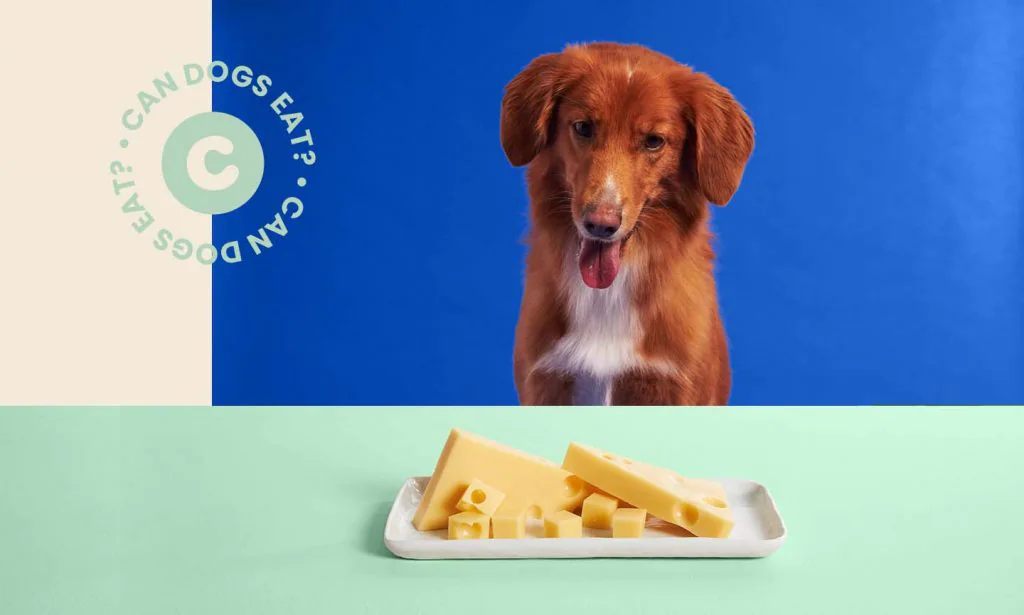Cheese is something that many people enjoy, whether as part of their diet or simply as a savory snack. But what many people don’t know is that cheese can be dangerous for dogs to eat. In fact, it can lead to serious health problems, including stomach bloat and even food poisoning. Before you give your dog some cheese, be sure to read this expert dog care article first to learn all the facts about how cheese can affect your pet. By doing so, you can make sure that your dog stays healthy and happy while enjoying his favorite snack.
What kind of cheese can dogs eat?
Dogs can technically eat cheese, but there are a few things to keep in mind. First, make sure the cheese is made from cow’s milk and not some other type of milk. Second, check the ingredients list to make sure there aren’t any harmful chemicals or additives in the cheese. Third, be sure to give your dog small amounts at a time so they don’t get sick. Finally, always supervise your dog while they are eating cheese to ensure they don’t get into anything they shouldn’t!
How much cheese is OK for dogs?
Regular cheese is a good source of protein and essential vitamins for your dog. The American Veterinary Medical Association (AVMA) recommends up to 1 cup (230 grams) per day for adult dogs and up to 1/3 cup (79 grams) per day for puppies. However, keep in mind that not all cheeses are created equal. Cheeses with high moisture levels, such as blue cheese or Roquefort, can be dangerous for your pet if consumed in large quantities.
To avoid potential health problems, make sure to read the nutrition label before giving your dog cheese. Additionally, avoid giving your dog processed cheese products, which may contain additives that can be harmful to their health. If you do give your dog cheese, make sure it is cut into small pieces so it doesn’t form clumps in their stomachs.
What cheese can you not give dogs?

The short answer is yes, most types of cheese can be eaten by dogs. However, there are a few caveats to keep in mind before feeding your pup some cheese.
Cheese is high in calories and fat content, so it’s important to monitor how much your dog is eating and make sure they’re getting the right kind of nutrients too. Too much cheese can also cause weight gain or obesity in dogs, so be mindful of their calorie intake.
Some other things to consider when feeding cheese to a dog include: whether they have a dairy allergy; if they’re pregnant or nursing; if they have any health issues like GI problems or liver disease; and if their diet is already high in calcium. If you’re not sure about whether your dog can eat cheese, consult with a veterinarian first.
Is Cheddar cheese OK for dogs?
Cheese is a popular food for dogs, but there are some considerations to make before feeding your dog cheese. Cheese is high in fat and cholesterol, which can be dangerous for your dog if consumed in large quantities. Additionally, cheese can contain harmful bacteria that can cause diarrhea. If your dog does eat cheese, be sure to monitor their intake and give them water as well as plenty of fresh air to hydrate and eliminate properly.
also read= Can dogs eat strawberries?
Can dogs eat scrambled eggs?
Dogs can eat scrambled eggs, but there are a few things to keep in mind. First, make sure the eggs are cooked fully. Second, be careful not to overfeed your dog. Third, make sure the cheese isn’t too salty. Finally, make sure the eggs are served cold or at room temperature so they don’t get too warm for your dog.
Should dogs eat eggs?
There is no definitive answer when it comes to whether dogs should eat eggs. While some people maintain that eggs should not be fed to their pets, others argue that eggs can provide essential nutrients and minerals.
This largely depends on the breed of dog, as well as the specific diet plan being followed by the pet. There are many factors to consider when feeding eggs, such as whether they are raw or cooked, their age, and what type of egg they are. Ultimately, it is best to consult with a veterinarian before feeding any foods to your dog, as they may have specific dietary restrictions.
Why do dogs love cheese?
There are a few different theories on why dogs love cheese. One theory is that cheese is a common food that wolves consume, so domesticated dogs have developed an affinity for it. Another theory is that dogs smell the cheese and then associate it with something good, which makes them want to eat it. Some people think that dogs are attracted to the smell of cheese because it reminds them of their mother’s milk. Regardless of the reason, feeding your dog cheese is sure to make them happy!
Can dogs eat yogurt?
As with many of the foods we give our dogs, cheese is a controversial topic. Some say that unless it’s specifically made for dogs (and not humans), cheese is bad for canines. Others claim that if given in small amounts and as part of a balanced diet, cheese can be a healthful addition to a dog’s diet.
The American Kennel Club (AKC) recommends that all dog owners “limit the amount of dairy products their pets consume to no more than 1-2 cups per day.” The Academy of Nutrition and Dietetics(AND) agrees, noting that milk and milk products are high in calories and may contribute to obesity in pets. Therefore, any cheese your dog consumes should only be in small amounts and as part of a balanced diet.
If you’re considering giving your dog cheese, consider these guidelines:
1) Make sure the cheese is safe for dogs. Cheeses made especially for canines are typically lower in fat and have been pasteurized to prevent bacteria from growing. However, unpasteurized cheeses also exist and may be unsafe for dogs if they contain harmful bacteria or parasites. If you’re uncertain about the type of cheese your dog will enjoy, stick with store-bought varieties rather than making your own.
2) Divide the cheese into small chunks or slices. Giving your dog large chunks will likely result in them chewing on it rather than eating it whole. This could
Can dogs eat banana?
Bananas are a great source of potassium and vitamin C, but some people worry that dogs may not be able to digest them properly. While some dogs can eat bananas, others may experience diarrhea or stomach upset after eating them. If you’re unsure if your dog can stomach bananas, talk to your veterinarian first.
For most healthy dogs, bananas are a great way to get their daily dose of potassium and vitamins C. However, those with certain health conditions should avoid feeding bananas to their pets because they could experience adverse effects. In general, the safest thing to do is feed your dog small amounts of fresh fruits and vegetables every day; this will give them the nutrients they need while avoiding any potential health problems.
Can dogs eat ice cream?
Do you have a craving for a delicious ice cream sundae but don’t want to give your furry friend the chocolate, nuts and other allergens that may be in store? Fear not! Your four-legged friend can enjoy some of the most popular flavors too.
The answer to this age-old question is actually yes, dogs can eat ice cream. In moderation, of course – just as with anything else they might enjoy. And while it’s always best to consult your vet before introducing any new food or supplement to your pet’s diet, taking these steps should help keep them safe and healthy when indulging:
Make sure the ice cream you buy is certified organic . Many commercially produced ice creams contain dairy products from cows that have been treated with hormones or antibiotics. Non-organic brands tend to be less processed and contain ingredients such as honey which are beneficial for canine health. Dairy intolerances are fairly common in dogs so try to buy organic ice cream if possible.
. Many commercially produced ice creams contain dairy products from cows that have been treated with hormones or antibiotics. Non-organic brands tend to be less processed and contain ingredients such as honey which are beneficial for canine health. Dairy intolerances are fairly common in dogs so try to buy organic ice cream if possible. Choose lower carbohydrate versions . Higher carb versions of ice cream can spike blood sugar levels and leave dogs feeling thirsty later on; choose instead low-carb options like unsweetened vanilla almond milk or.
Is rice good for dogs?
Pets digestive systems are different from people’s, so it’s important to read the ingredient list on any food you give your dog. Some common ingredients that can cause problems for dogs include dairy products, soy products and grains.
Rice is a grain and should not be given to dogs as part of their diet. Dogs are able to digest rice just fine, but because it contains both starch and fiber, it can cause gas and bloating in some dogs. Rice also contains amylase which can break down starch into glucose which can be toxic to dogs.
Can dogs drink milk?
There is much debate about whether or not dogs can actually drink milk. Many experts believe that dogs are not able to fully digest the lactose in milk, which could lead to health problems such as diarrhea or even pancreatitis. Others maintain that although milk may not be ideal for dogs’ overall health, they can consume small amounts of it if it is mixed with other foods. Consult your veterinarian before feeding your dog any type of dairy product, especially if he is prone to any type of health issue.
Can dogs eat popcorn?
There is some debate about whether dogs can actually eat cheese. While some believe that dogs cannot consume dairy products, others claim that certain types of cheese, like hard cheeses, are not harmful to dogs. If you’re unsure if your dog can eat cheese, it’s best to err on the side of caution and avoid giving them any type of dairy product.
What Can dogs drink besides water?
Many people believe that dogs can only drink water, but this is not accurate. Dogs can also drink cheese, yogurt, and other dairy products. It is best to feed your dog small amounts of these items as part of a balanced diet. Be sure to read the labels to make sure there are no harmful ingredients in the food you are feeding your dog.
Can dogs eat bread?
There’s no definitive answer, as it depends on the dog’s diet and overall health. Some dogs may be able to digest bread well while others may have adverse reactions. If your dog consumes a lot of bread or any other grain-based products, it’s important to talk to your veterinarian about his or her diet and whether adding bread would be beneficial. In general, feeding your dog whole grains (like those in bread) is a good way to provide them with essential nutrients and fiber.

